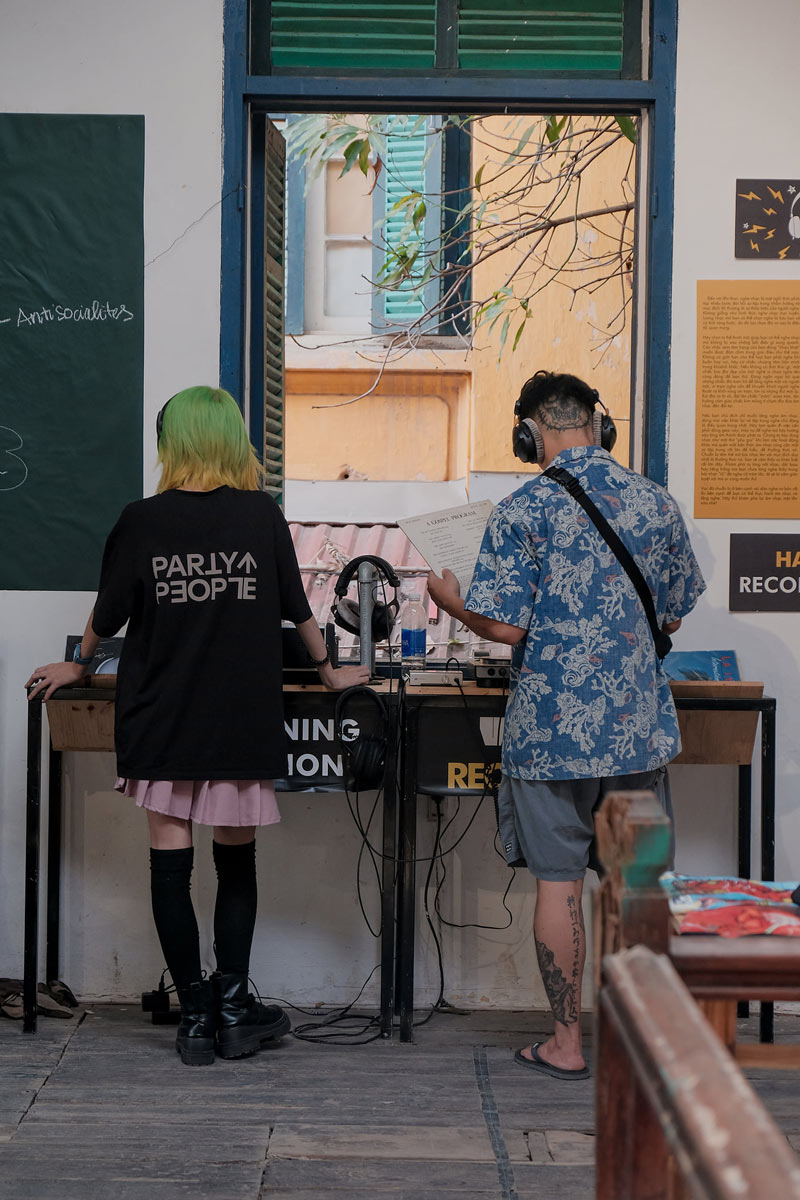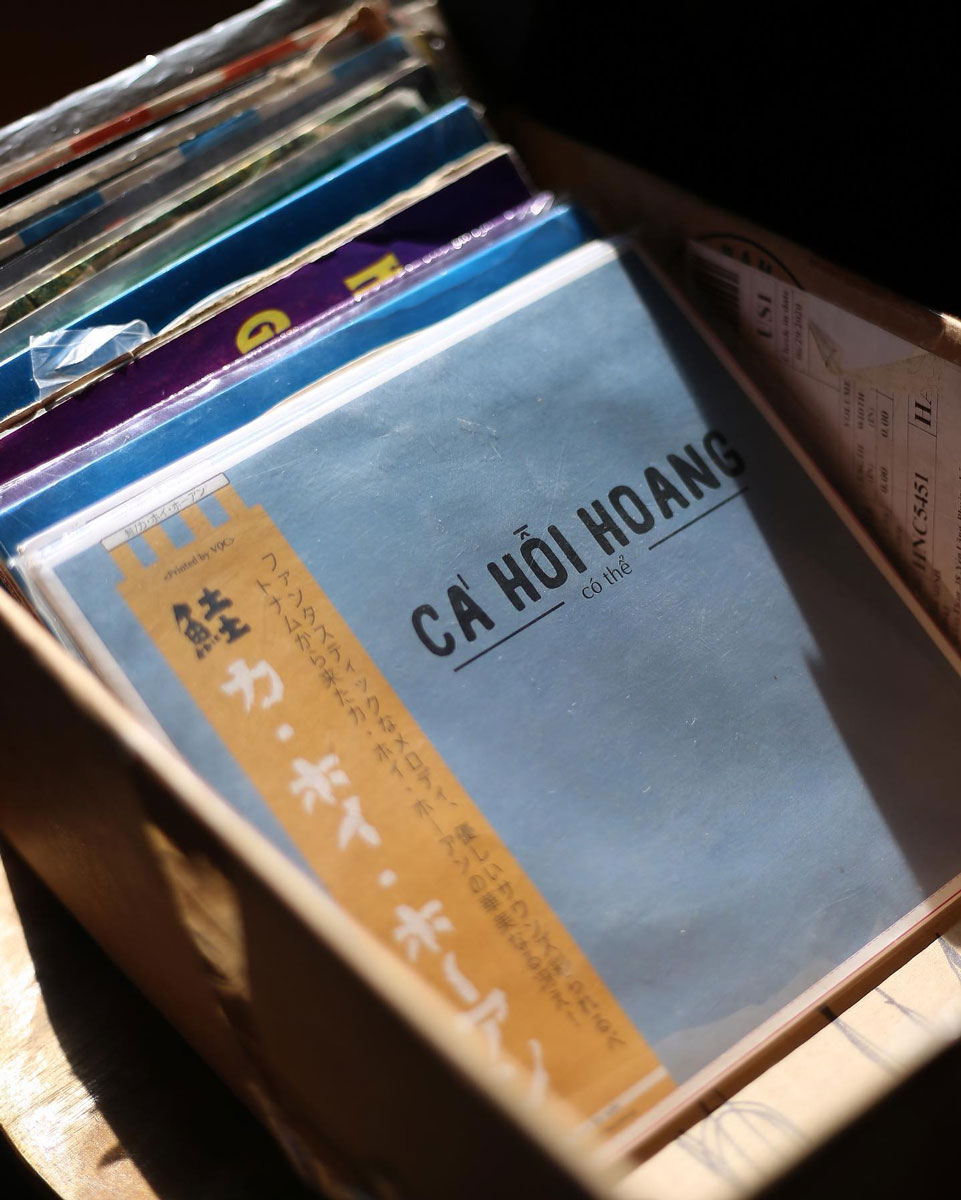In recent years, the global music scene has seen the comeback of vinyl, a late-1880s invention known for its rich, high-quality sound. And Vietnam is not the one to ignore the trend. Music producers and artists in the country are exerting efforts to bring back vinyl records, and reintroduce this musical sophistication to the new generation of music enthusiasts.
For Minh, having worked in a vinyl record shop owned by his father, the appreciation towards this musical culture is somewhat innate. But he also noticed how, with the music industry’s digital transformation, vinyl remains unfamiliar, almost disregarded.
This was when he and his three close friends Huy, Dũng and Vũ, decided to open their own vinyl records brand called Vọc Records. Vọc Records was born from the desire to expand and spread a seemingly forgotten culture as systematically as possible to the Vietnamese youth.
Where does this passion for vinyl come from?
I was inspired by none other than my father (Mr. Trần Hải Đăng) and my uncle (Mr. Trần Đại Dương). My father studied music since he was 14 years old, then became a sound engineer and is now the Vice President of Vietnam National Academy of Music. In 2010, my father and uncle opened “Hà Nội Đĩa Than” (Hanoi Vinyl Records), and since then, it has become a familiar gathering place for vinyl lovers in Hanoi.

At that time, Hanoi had very few vinyl record stores like that. To my father and uncle, Hanoi Dia Than does not insist on trading, but just wants to be a gathering place for everyone to come and talk with others who share the same passion.
How does Vọc Records mend the “gap” in music?
Having been introduced to music at a young age, I noticed an interruption in the ways music was enjoyed by many different generations. The 1960s to 1980s were considered the golden era of international music, but were rather lackluster in Vietnam, perhaps partly because of the war.
Not only that, even domestic music of that time for various reasons was not widely popularized. That’s the reason the young generation know too little about music from the past. Fortunately, those tunes still exist in vinyl forms, so I consider spreading vinyl culture to be a way to mend this interruption.

Moreover, although there are also some people who have the opportunity to approach and share rare melodies online, there is almost a lack of guidance and navigation, so listeners often do not fully enjoy these songs. On the other hand, online platforms, although automated and easy to use, are subject to too many algorithms, making the journey of music discovery unnatural. Vọc Records wants to be the “middle man” in this journey, carefully selecting and guiding in the most natural way possible, so that listeners get the best listening experience with vinyl.
What are the initial difficulties when establishing a record store?
When I started the store, I realized that the types of music that I liked and wanted to “sell” had almost no presence in the minds of Vietnamese customers at that time, or there were only a few of them who knew of these genres. So the only way to sell an “odd” album was to do the job of a well-operated record label, promoting the music in that album in the most attractive way, and at the same time sharing with newcomers about vinyl culture.

Before Vọc, I noticed that vinyl communities in Vietnam mostly operated in a closed manner and vinyl lovers in those communities were mostly older adults, so the barrier to newcomers was huge if there was a lack of guidance. Therefore, Vọc’s concern is how to remove this barrier to spread and encourage passionate young people to engage in this musical culture.
Many people think that vinyl is only for the rich. How are you changing this misconception?
The reason there is a comparison between high and low prices in music is because people think about the cost to be able to listen to music. Currently, the most popular form of listening to music is undisputedly online streaming. For the price, obviously, nothing can be as low-priced as streaming, but what people often confuse is the listening experience they bring. The same output is music, but listening from the vinyl record is different from digital streaming.

Not only that, although it has been around for a long time, vinyl records is a somewhat closed hobby, so it is often wrongly prejudiced. One of which is that collecting vinyl records costs a lot of money. But it is like any other hobby, depending on different financial conditions that people collect and enjoy in different ways possible.
At Vọc Records, we sell music experiences, not just vinyl records. We do not insist on spending too much money on expensive equipment, but on how to enjoy the tune to the fullest.
So what “method” should be preferred when listening to music?
Personally, I choose both, not favoring either side.
Listening to music on vinyl is actually owning the music in it. The vinyl record is an entity that can be held and interacted with, so it will have a more physical value. This method of listening gives me the opportunity to discover music in the purest way, because there are items like posters, lyric books, or rare postcards that only come with vinyl records.

Meanwhile, listening to music on online platforms is like “renting” music, and the “rental shops” will suggest new albums thanks to an algorithm. This is also a convenient source for music reference when listeners want to consider before buying vinyl records.
Are there many record store models in Vietnam?
The record store model in Vietnam has become much more popular since my father’s generation. However, I think these models will develop to their full potential in the next five years, until they reach international standards. When that time comes, I believe that the hobby of collecting vinyls will be more popular among Vietnamese people.

What is interesting about operating Vọc Records?
Looking from the outside, people will see that we are young people selling slightly “old” items. But from the perspective of the operator at Vọc, I see people of all ages and classes coming to the store and getting fascinated by the discs that emit music.
Next, I had the opportunity to “dig” into a lot of discs with unique and odd music genres for screening before putting them on sale. Many people only listen to music in their free time, meanwhile, I am “forced” to listen to music.

With Vọc, I and my friends Vũ, Dũng and Huy as people with great passion for music, want to share these tunes with everyone. If not us, then who would dare spread this beautiful vinyl culture to the new generation?
Can you share more about Hanoi Records Day?
Hanoi Records Day is a free music sharing event, and what is special about it is that 100% of the music in the event is played from vinyl records. This event was first held in September last year, and stemmed from a very simple idea: the journey of discovery.
The first is to discover the ritual of enjoying music which has been present for a long time but quite unfamiliar to most Vietnamese people. I’ve been to Japan and witnessed that the vinyl community there was very active, so I felt quite disheartened to see that in Vietnam, there were not only few, but vinyl lovers were also in closed communities and not openly shared.

Beginners will find it difficult to learn and keep the passion burning for a long time. So I wanted to create a playground where everyone can participate in experiencing the beauty and complexity of vinyl. I don’t expect anyone who came to listen to buy Vọc’s discs, just seeing their enjoyment while listening to them is enough of a goal.
The second is the discovery of the music world in its golden age. Even some of the Vietnamese melodies have a gap with the younger generation. I want to mend that interruption and Hanoi Records Day could not be a better opportunity to rediscover this music in the most interactive way. Listeners have the freedom to search and experiment, with no machines or algorithms interfering.

And finally, I want Hanoi Records Day to be a place that gives music producers the opportunity to find tunes they’ve never heard before, or more broadly, to find inspiration.
There is a technique called “sampling” in Hip-Hop. And the best samplers all have a common habit, which is to “crate-digging” strange vinyl records and then “modify” these melodies, sample them into their own music. The most famous producers who used this method are Nujabes or J Dilla. In Vietnam, there are also artists who sample music from vinyl to create their works.
How does Vọc Records operate now?
Vọc still operates as a vinyl record store and partly a record label, because Vọc’s main job is to introduce existing artists and albums. Hopefully in the future I can bring Vọc to become a professional record label.

Besides, Vọc is making changes in communicating with and providing information to audiences. In the past, we mainly provided information and knowledge about vinyl records through social media posts. But now we have a blogging platform on our site and a YouTube channel for everyone to follow and subscribe.

Currently, we are implementing the Lost And Found Grooves project, which includes a series of articles introducing both new and old artists and music genres. At the same time, this project also includes a series of videos introducing different sets of selected vinyl records, uploaded on our YouTube channel. With these videos, we carefully select and implement different topics, as well as ensure the high quality of images and sounds. Our audiences can both listen to and read the article to further immerse in the content, and if they like it, they can save it and listen to it anytime they want.
In this era of digital music, do you think Vietnamese people are willing to give it up and switch to playing vinyl?
I know for sure that many young people are ready to follow the vinyl culture.
People often think of streaming music and vinyl records as destructive rivals, but it’s actually the opposite. Online streaming gives listeners the opportunity to approach many artists, experiment with many styles before deciding to spend money to collect and support those artists.
Moreover, not only artists from former generations, but now big contemporary names like Kendrick Lamar, Bruno Mars, or Taylor Swift have also released vinyl versions of their albums and are constantly selling out. This is proof of the longevity of the vinyl records.

In addition, vinyl comes with exclusive items that music on other platforms can’t provide. On the streaming platform, people will only see the front cover of the album, but the back cover is where interesting information is written, such as who the bassist is in this particular quartet, or where the cover was inspired from.

Another reason is that vinyl belongs to the category of traditional values, and there will always be people who will protect that value. No matter how modern digital cameras become, people will still find joy in film cameras, and I believe the same goes for vinyl records.
The vinyl record, in addition to its function of storing music, is also an immortal symbol representing music, a historical witness of musical culture. It was the cradle of many famous artists in the current era. So its attraction is eternal, not just a passing trend.
Adapted by Thao Van
